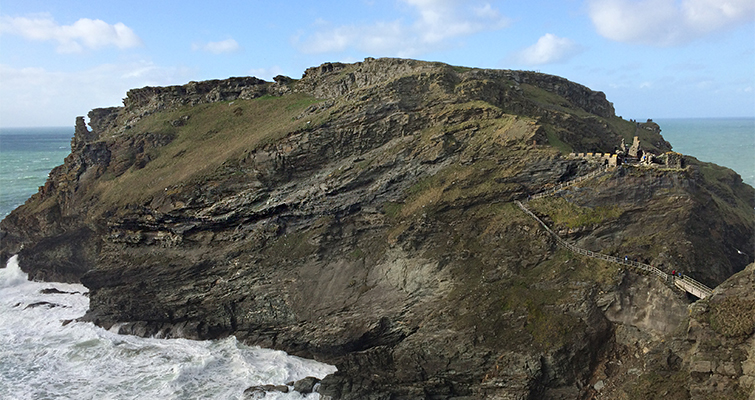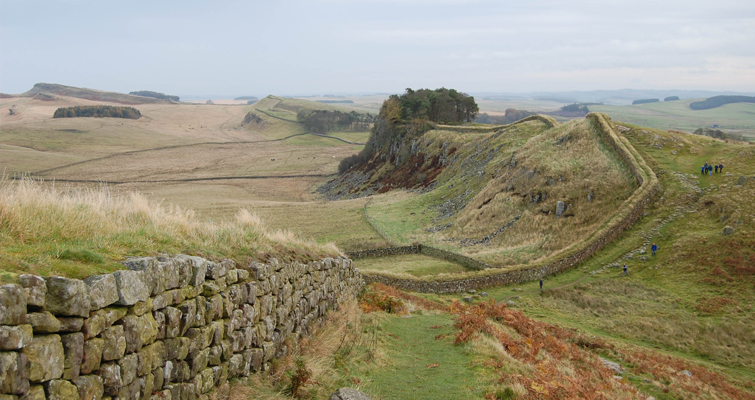Current Research
Tintagel: Trans-European Connections in the Post-Roman World
British Academy Postdoctoral Fellowship Project (Dr Maria Duggan, Archaeology)
This 3 year British Academy funded project will provide a detailed analysis of the imported ceramic assemblage from the early medieval settlement at Tintagel in Cornwall. It aims to develop knowledge of Britain and Europe during the 5th to 7th centuries – focusing on understanding connections between the East Mediterranean and Atlantic regions, contacts between communities living along the Atlantic Seaboard and the significance of exotic commodities within the emerging societies and political structures of late antique/early medieval Western Europe. The project involves a collaboration with the Fitch Laboratory at the British School at Athens, which will enable scientific examination of this internationally important assemblage, and is reliant on the support of The Duchy of Cornwall, English Heritage, The Royal Cornwall Museum, The British Museum, and Cornwall Archaeology Unit for accessing collections.

The Sarum Hymnal Project
Funded by the British Academy’s Neil Ker fund, and supported by Animating Text at Newcastle University, The Sarum Hymnal in Manuscript and Print is creating an online edition of the noted Sarum Hymnal. Noted hymnals contained strophic texts, along with their musical notation, as sung during the Offices that punctuated the day (Matins, Lauds, Prime, Terce, Sext, None, Vespers and Compline); these texts and, in many case their associated melodies, varied according to the complex interactions of different calendar cycles.
The project investigates two important witnesses, one manuscript and one printed, both of which are important survivors from the final decades of Latin worship in England. St John’s College, Oxford, MS 60, is a fine copy made by the versifier, cleric, and music copyist William Forrest around 1540. Perhaps the last surviving chant book to be copied in England, it belonged at one time to Robert King, first bishop of the short-lived diocese of Osney. The contents of Forrest’s manuscript will be collated with one of the first printed hymnals, Jacques Cousin’s edition of 1518 printed in Rouen. This edition, overlooked by the Short-Title Catalogue and omitted from EEBO, has been digitized by DIAMM from a copy belonging to Liverpool Anglican Cathedral’s Radcliffe Collection, now held at Liverpool Hope University Library; we are very grateful to them for permitting images of the Cousin edition to be published online.
Scholarly Editing: The Complete Works of Thomas Nashe
This 5 year project (2015-2020), supported with an AHRC Research Grant, will establish a new scholarly edition of The Complete Works of Thomas Nashe (6 volumes, to be published by Oxford University Press, 2021).
Nashe is one of the most influential writers of the late sixteenth century, a key influence on the dramatic writing of his time (e.g. he co-wrote with Shakespeare), on modern prose style, and on the English language. A unique feature of this project is the attention it gives to the orality and performance potential of Nashe's writing, both his prose fiction and his sole-authored play 'Summers Last Will and Testament'. The project is partnered with The Globe Theatre, London; the boys' company Edward's Boys, Stratford upon Avon; The Old Palace School, Croydon; The Folger Shakespeare Library, Washington, and Norfolk Museums. The team will be collaborating with the OED too.
The lead investigators of this project are Professor Jennifer Richards (Newcastle University) and Professor Andrew Hadfield (Sussex University), and the Co-investigators Professor Joe Black (Massachusetts, Amherst), Professor Cathy Shrank (Sheffield) and Professor Jonathan Hope (Strathclyde).
History of Reading Aloud: Voices and Books 1500-1800
Voices and Books, 1500-1800 is an AHRC network of early modern scholars based in the UK and US (literary scholars, linguists, historians, musicologists) and partners (British Library; City Library, Newcastle;National Early Music Association UK; The Reading Experience Database;Seven Stories) who are committed to recovering the history of reading aloud and listening to books. We want to establish the ubiquity of this practice, but also understand how the voicing of scripted text structured different communities and practices of sociability.
The lead investigators of this project are Professor Jennifer Richards (Newcastle University) and Professor Richard Wistreich (Royal Northern College of Music). The Voices and Books Network Co-ordinator is Dr Helen Stark.
Music: Tudor Partbooks: the manuscripts legacies of John Sadler, John Baldwin and their antecedents
Tudor Partbooks, launched on 29 September 2014, has two main objectives: to transform access to English musical sources from the lifetimes of Henry VIII and Elizabeth I, and to bring about a step-change in our understanding of this important corpus of manuscripts from the golden age of polyphony. Partners and collaborators include the British Library, the Bodleian Library, the British Academy, the Oundle Festival, and the vocal ensemble Stile Antico. Among numerous outputs, the project will to the publication of reconstructed facsimiles of two sets of Elizabethan partbooks, copied by the singer John Baldwin and the Northamptonshire priest and schoolmaster, John Sadler.
The lead investigators on this project are Dr Magnus Williamson (Newcastle University) and Dr Julia Craig-McFeely (Oxford University, and the Digital Image Archive of Medieval Music: Faculty of Music, Oxford).
Archaeology and DH: The Cutting Edge
The Cutting Edge project will bring together different sources of information relating to several important archaeological and World Cultures collections. Housed mainly within Newcastle University’s Great North Museum, but also including wider collections within Tyne & Wear, our data will relate to tools with sharp edges. These include stone and metal axes, and knives and weapons of various historical periods, and will be used to create a new online resource that will support teaching and research into the analysis of use-wear patterns on these objects. This innovative project will allow the comprehensive study of 1000 objects, in particular their use-wear patterns, by scholars and members of the public worldwide. Prof. Cross is currently involved with this project.
Sacred Landscapes in Late Byzantium
The interdisciplinary research project “Sacred Landscapes in Late Byzantium” (SLLB) explores late Byzantine hagiographical compositions, especially the saints’ lives composed by the fourteenth-century Constantinopolitan Patriarch Philotheos Kokkinos (ca. 1300–1378). The first line of inquiry focuses on the creation of sacred landscape(s) in fourteenth-century Byzantium and analyzes the travel accounts embedded in late-Byzantine saints’ lives in order to visualize and chart the coordinates of late-Byzantine sacred landscape(s). Additionally, the project explores the attitude(s) towards and representation(s) of women in late Byzantine patriarchal society and the textual transmission of Philotheos Kokkinos’ vitae. The project also includes the preparation of critical editions for two hitherto unedited hagiographical texts written by Kokkinos, namely the Logos on All Saints (BHG 1617g) and the Logos enkomiastikos on the Twelve Apostles (BHG 160h).
WallCAP - Hadrian's Wall Community Archaeology Project
Dr Rob Collins and Professor Sam Turner
WallCAP is an HLF-funded project focusing on two inter-related strands of activity and research: Heritage At Risk and Stone Sourcing and Dispersal. Working with volunteers and local communities, we will research, assess, and address factors that impact on the deterioration and survival of the archaeological remains of the Hadrian's Wall World Heritage Site. Concurrently, volunteers and communities will also attempt to understand where the stone that built the Wall came from, and where it ultimately ended up once it was robbed from the Wall. The project will not only allow us to better understand Hadrian's Wall in its ancient landscape, but also its existence in modern communities, engaging visitors and residents with its long-term heritage.
https://twitter.com/Wall_CAP

Adam Morton, Anti-Catholicism in British History 1520-1900
This network is funded by the Arts and Humanities Research Council (AHRC) and brings together scholars from a range of disciplines (History, Art History, Literature, Social Psychology) and who work on a diverse range of historical periods (the sixteenth to the nineteenth centuries) to consider anti-Catholicism as a major aspect of modern British History.
https://antipopery.com/




